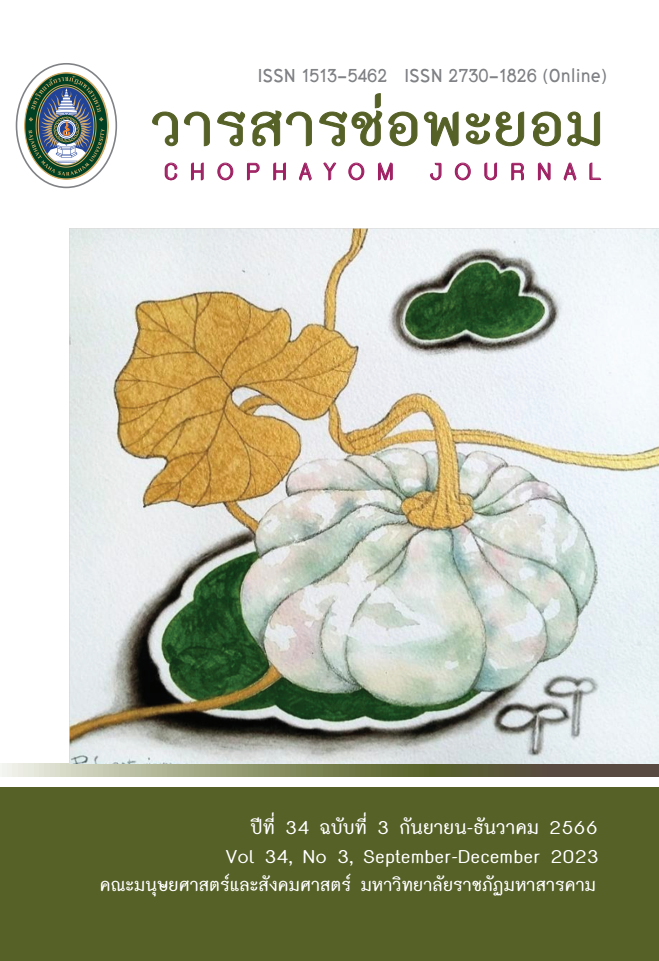Development of Science Process Skills and Learning Achievement of Prathomsuksa 3 Students on the Topic of Sun and Life by Inquiry-Based Learning (5Es) and model
Keywords:
Science process skills, Learning achievement, Inquiry based learning (5Es), ModelAbstract
The objectives of this research were 1) to compare the learning science process skills after learning by using Inquiry- based learning (5Es) and model, with an average of 70 percent, 2) compare the learning achievement on Sun and Life before and after learning by using inquiry-based learning (5Es) and model, and 3) to study students’ satisfaction upon using inquiry-based learning (5Es) and model. The sample consisted of 29 Pratomsuksa 3 students at Chumpae school in the 2nd semester of the academic year 2022. The research instruments consisted of 1) lesson plans using inquiry - based learning (5Es) and model, 2) science process skills test, 3) the achievement test and 4) satisfaction questionnaire. The statistics used were percentage, mean, standard deviation, t-test for one sample, and t-test for Dependent Samples. The findings were as follows:
1) The students' science process skills after learning were statistically higher than those the criteria 70 percentage at .01 level of significant difference.
2) The students' learning achievement after learning was statistically higher than those before learning at the .05 level of significant difference.
3) The students' satisfaction with the learning management based on 5Es with the use of modelshowed at the highest level. (= 4.82, SD.= 0.32)
Keywords: Science process skills, Learning achievement, Inquiry based learning (5Es), Model
References
กระทรวงศึกษาธิการ. (2561). หลักสูตรแกนกลางการศึกษาขั้นพื้นฐานพุทธศักราช 2551. กรุงเทพฯ: ชุมนุมสหกรณ์การเกษตรแห่งประเทศไทย.
เกียรติศักดิ์ รักษาพล และธนกร แย้มประพาย. (2563) การพัฒนาทักษะกระบวนการทางวิทยาศาสตร์ของนักเรียนระดับชั้นประถมศึกษาปีที่ 1 ด้วยวิธีการสอนแบบวัฏจักรการสืบเสาะ หาความรู้ (5Es). วารสารการบริหารนิติบุคคลและนวัตกรรมท้องถิ่น, 6(6), 199-212.
จันทร์ทิพย์ มีแสงพันธ์ (2562) ได้ศึกษาการพัฒนาทักษะทางวิทยาศาสตร์และเทคโนโลยี โดยการจัดการเรียนรู้แบบบูรณาการสตีมผ่าน กระบวนการสืบเสาะหาความรู้สำหรับนักเรียนชั้นประถมศึกษาปีที่ 3. (วิทยานิพนธ์ปริญญาหาบัณฑิต, มหาวิทยาลัยศิลปากร).
ไชยยศ เรืองสุวรรณ. (2553). เทคโนโลยีการศึกษา: ทฤษฎีและการวิจัย. กรุงเทพฯ: โอ.เอส.พริ้นติ้งเฮ้าส์.
ประสาท เนืองเฉลิม. (2558). การเรียนรู้วิทยาศาสตร์ในศตวรรษที่ 21. กรุงเทพฯ: แอคทีฟพริ้นท์.
พิมชนก เจริญชีพ. (2564). การพัฒนาผลสัมฤทธิ์ทางการเรียนรู้วิชาวิทยาศาสตร์ เรื่องระบบหมุนเวียนเลือดด้วยการจัดการเรียนรู้แบบสืบเสาะหาความรู้ (5Es) ร่วมกับการใช้แบบจำลองของนักเรียนชั้นมัธยมศึกษาปีที่ 2, วารสารศาสตร์การศึกษาและการพัฒนามนุษย์, 5(1), 26-39.
เพ็ญพักตร์ ช่วยพันธ์. (2560). ผลของการใช้กระบวนการเรียนรู้ 5 ขั้นตอน ที่มีต่อทักษะกระบวนการทางวิทยาศาสตร์และความคิดสร้างสรรค์ทางวิทยาศาสตร์ กลุ่มสาระการเรียนรู้วิทยาศาสตร์ ของนักเรียนชั้นมัธยมศึกษาปีที่ 3. (วิทยานิพนธ์หลักสูตร ครุศาสตรมหาบัณฑิต, มหาวิทยาลัยราชภัฏนครศรีธรรมราช).
วีนัส ภักดิ์นรา. (2565). เอกสารคำสอน รายวิชา การจัดการเรียนรู้และการจัดการในชั้นเรียน. เลย: คณะครุศาสตร์ มหาวิทยาลัยราชภัฏเลย.
สถาบันส่งเสริมการสอนวิทยาศาสตร์และเทคโนโลยี. (2546). คู่มือวัดผลประเมินผลวิทยาศาสตร์. กรุงเทพฯ: สถาบันส่งเสริมการสอนวิทยาศาสตร์และเทคโนโลยี.
อับดุลเลาะ อูมาร์. (2560). ผลของการจัดการเรียนรู้แบบสืบเสาะหาความรู้ (5Es) เรื่องสมดุลเคมีที่มีต่อแบบจำลองทางความคิด ผลสัมฤทธิ์ทางการเรียนและความพึงพอใจของนักเรียนชั้นมัธยมศึกษาปีที่ 5 โรงเรียนเดชะปัตตนยานุกูล จังหวัดปัตตานี. (วิทยานิพนธ์ศิลปศาสตรมหาบัณฑิต, มหาวิทยาลัยสงขลานครินทร์).
Gilbert, J.K., Boulter, C. J.; & Rutherford, M. (2000). Explanations with Models in Science Education. Developing Models in Science Education, 1965, 193-208. doi.ort/10. 1007/978-94-010-0876-1_10.
Downloads
Published
How to Cite
Issue
Section
License
Copyright (c) 2023 Chophayom Journal

This work is licensed under a Creative Commons Attribution-NonCommercial-NoDerivatives 4.0 International License.






